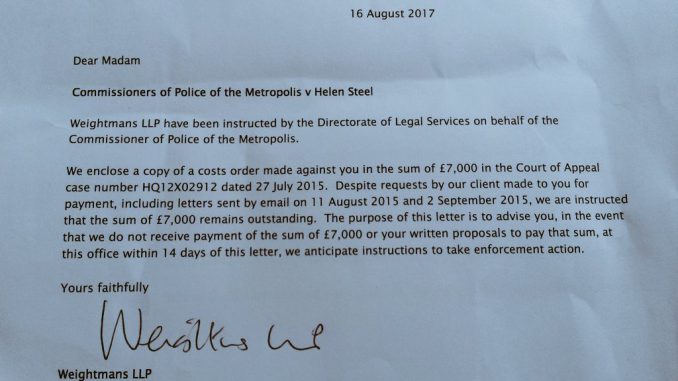
Within the past week it has emerged that the Metropolitan Police is demanding £7000 payment for a costs order it obtained against Helen Steel, the victim of one of its undercover cops and to whom it made an unreserved apology for abusing her human rights in 2015.
A letter from the Met’s solicitors, Weightmans LLP, appeared on social media. Dated 16 August, it threatens: “In the event we do not receive payment of the sum if £7000 or your written proposals to pay that sum, at this office within 14 days of this letter, we anticipate instructions to take enforcement action.” This could mean another court hearing to send bailiffs to seize Helen’s property.
Helen and me met as teenage animal rights campaigners in the eighties. We went on loads of demonstrations and got arrested. in 1985 she co-founded Support Animal Rights Prisoners, the first organisation specifically for people sent to prison for animal liberation. During this time many activists were locked up for militant actions such as breaking into laboratories.
Helen would have been a natural target for special branch operations but she did not join London Greenpeace (LG) until 1987. By then spycop Bob Lambert had been in the group three years and his deployment was winding down as his successor John Dines was introduced in October. Helen knew Lambert but they were not close friends.
Dines, using the alias John Barker, rose to prominence in LG and in the London anarchist scene. Like Lambert he had a van for ferrying people home from meetings and demonstrations. He targeted Helen by giving her lifts and sending her cards and by early 1990 they were in a relationship. They moved in together and when I visited them it was obvious she was very happy and in love. Helen has since revealed they discussed having children and spending the rest of their lives together although unbeknownst to her Dines was already married with a family.

Following the Special Demonstrations Squad pattern Dines began feigning mental illness and going away for periods. He and Helen moved to a friend’s smallholding in Yorkshire but he immediately left claiming to have found work on the Channel Tunnel. In reality his deployment was over and in April 1992 Helen received two letters from South Africa. In one he wrote ‘if I ever sort my head out I’ll come back.” Helen describes this as “emotional torture” and spent the next 19 years finding out the truth.
By 1994 she had discovered the real John Barker had died aged eight. That year Dines left the Met and went to New Zealand where his in-laws lived. By coincidence Helen also had family there and in 2002 she travelled there to see them. Fearing she would find Dines, Scotland Yard decided to uproot and relocate their former spy to Australia. Soon afterwards Helen found his marriage certificate which listed his occupation as police officer.
Throughout this time we still saw each other at meetings or demos and sometimes socially but Helen never divulged what really happened. All I knew was her relationship with Dines ended after he left the country. However, the fact we were still in contact possibly influenced the exit strategy of spycop Matt Rayner. Lambert, by now SDS operations manager, may have judged the mental instability ruse too risky in light of Dines’ departure. Instead Rayner’s ploy was to relocate his supposed job to France, then Argentina.
It wasn’t finally confirmed that Dines was an infiltrator till the end of 2010. Laura, ex-wife of another spy Jim Boyling, told Helen he’d said: “I feel really sorry for Helen. She was spied on three times, by Lambert, Dines and me.”
In 2011, Helen was one of eight women who took legal action. The Met spent years trying to have the case thrown out of court by arguing it could “neither confirm nor deny” (NCND) that undercover officers were spies. In 2014 the High Court ruled the Met couldn’t use NCND as a blanket response to the women’s claims. But in the case of Dines it said that as unlike Lambert and Boyling his true identity hadn’t received official confirmation, “the Commissioner should not be required to admit or deny whether [he] is an undercover officer or has the real name alleged.”
Helen was given leave to appeal against the decision that NCND shouldn’t apply to Dines. The Met, despite having entered into talks to settle the women’s civil claim, tried to get the appeal struck out. Helen had to represent herself at a hearing to decide if this would be granted as she was not eligible for legal aid. She was warned by the court that if she lost the costs would outweigh any damages she would receive and, anyway, the forthcoming public inquiry would provide a safe costs-free environment in which issues of NCND and disclosure of spycops’ identities. Helen reluctantly agreed to drop her appeal.
A few months later Scotland Yard issued an unreserved apology to all eight women who were deceived by its officers. It said:
Thanks in large part to the courage and tenacity of these women in bringing these matters to light it has become apparent that some officers, acting undercover whilst seeking to infiltrate protest groups, entered into long-term intimate sexual relationships with women which were abusive, deceitful, manipulative and wrong.
I acknowledge that these relationships were a violation of the women’s human rights, an abuse of police power and caused significant trauma. I unreservedly apologise on behalf of the Metropolitan Police Service.
Helen is one of the women abused by the Met. First by its spy Dines entering into an abusive relationship with her, then when it used NCND to obstruct her claim for years, and now by using bully boy tactics to intimidate her. The hearing lasted barely one hour, yet she it asks her to pay £7000 costs when she was only trying to compel it to do something it should have done anyway. Helen and the other women received damages along with the apology, yet the Met now wants to claw back some of that money in the most disgusting way possible.
Whilst this is truly shocking, those of us involved in spycops campaigns are not in the least surprised as it is merely the latest example in a pattern of appalling behaviour by the police.

In March 2016 Helen finally confronted Dines 24 years to the day after she had last seen him. He was working at the Australian Graduate School of Policing and Security, part of Charles Sturt University, training Indian police officers in “emerging challenges, viz, Left Wing Extremist and other low-intensity conflicts” and was about to meet a delegation of officers at Sydney Airport.
Helen said she was concerned that he was training others in carrying out the same operations as he had, now acknowledged as human rights abuses. The university said: “While Dines is listed as a course director on several documents, a university spokesman said this role “is administrative only and does not involve teaching”.
Dines sent an email to the Guardian, who covered the story, which stated: “You will already be aware that I met with Helen Steel on 6 March, where I gave a her a personal and unreserved apology for all and any hurt that she may have suffered. I do not intend to make any other comment.”
The public inquiry finally confirmed Dines as a spycop in December 2016. Helen said: “While I welcome the official admission that my former partner John Dines was an undercover policeman in the Special Demonstration Squad, it is a travesty that the police have been allowed to take this long to confirm what I and others exposed years ago”.
John Dines’ profile on Powerbase. http://powerbase.info/index.php/John_Dines#cite_note-au-43